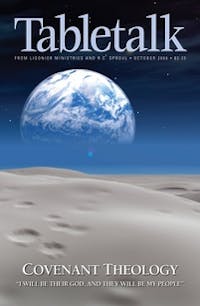
Request your free, three-month trial to Tabletalk magazine. You’ll receive the print issue monthly and gain immediate digital access to decades of archives. This trial is risk-free. No credit card required.
Try Tabletalk NowAlready receive Tabletalk magazine every month?
Verify your email address to gain unlimited access.
We are a litigious people. We not only like to sue one another, we like to avoid being sued, and having to sue. That is, we hire lawyers not only to write up contracts, but to help enforce contracts. Handshakes and verbal agreements have gone the way of the nickel cup of coffee. (And be careful with that coffee now. It just might be hot, and you wouldn’t want anyone to sue.) As a culture we can barely even agree to disagree.
On the other hand, we are likewise a licentious people. We want our pleasures, and we want them now, and nothing, we seem to believe, ought to stand in our way. We have our rights, and by rights, we will have them. Contracts, the saying goes, are made to be broken.
It is a strange marriage in a given culture. The great English novelist, Anthony Burgess, in his great work, A Clockwork Orange, speculated that cultures are doomed to alternate between two extremes of the pendulum. Sometimes a culture embraces a Pelagian view of man, what Burgess called the “Pel phase.” Here man is seen as basically good, and all restraints are inherently bad. This romantic notion, however, soon loses its romance, as sinful men without restraint begin to, well, sin. Their sin grows bolder and bolder until the culture reacts, and enters into the “Aug phase,” named for Augustine. Here man is looked at as fundamentally sinful, and restraints are all the rage. The state, in seeking to restrain sin, soon enters into sin, becoming ever more oppressive itself. Soon enough the people tire of a heavy handed state, and the pendulum swings back the other way.
His analysis, a case could be made, reflects similar thinking on the issue of the Trinity. Some cultures tend more toward the one, and exhibit a uniformitarianism, often manifested as totalitarianism. Other cultures tend toward the three, (or the many) and, as T.S. Elliot put it, the center cannot hold. Culture simply disintegrates in a fog of variety. The solution here is, of course, the Trinity, where the one and the many come together in peace. But what of the shift from a permissive culture to a repressive one and back again? The answer here is covenant.
Just as the Trinity brings together the one and the many, so covenant binds together (or marries, if you will) the legal and the familial. Covenant does not merely reduce down to contract, for such misses the inherent grace therein. God did not create Adam and Eve as tabula rasa (blank slates), placing them in a neutral realm and then waiting to see which way they would go. Instead, He blessed them with life and a garden. He put them in a paradise they did not earn, and He walked with them in the cool of the evening. This relationship, however, wasn’t some sort of anything-goes, if-it-feels-good-it-must-be-good relationship. Yes, God loved them. Yes, He blessed them. But He established that love and the boundaries by which it might be protected by making covenant. It is in this context, in the context of a loving father in relationship with His children, that God first establishes covenant with man.
Covenants, rightly understood, then, are not merely contracts, the legal forms of legal relationships. Neither are they formless sentimental feelings that bring people together as long as those feelings last. Instead, they are both. In covenant we have real obligation. Real promises are made, and real sanctions handed down when those promises are broken. But underlying all of that is grace, love, and relationship.
This is why Paul speaks of our heavenly Father this way, “It was to show his righteousness at the present time, so that he might be just and the justifier of the one who has faith in Jesus” (Rom. 3:26). God did not wink at our sin because He loved us. Instead, because He loved us, He punished our sin in His Son on the cross. He wanted to justify us because He loves us. He did it justly by punishing His only begotten Son.
Grasping covenant is not only necessary for understanding the Word of God, but it is our only hope, culturally speaking, to escape the pendulum of which Burgess wrote. It was in fact our understanding of covenant that birthed the freest nation the world has ever known. It is no accident that the British, during the time of the Revolutionary War, referred to it as “the Presbyterian war.” We are a nation founded on the principle of covenant, beginning even before the Revolution with the Mayflower Compact.
A nation built upon covenant is a nation that recognizes the sinfulness of man, and so wishes not only to restrain the sinful impulses of the individual but also to restrain the sinfulness of men who have power in the state. As Lord Acton observed: “Power corrupts, and absolute power corrupts absolutely.” To restrain the state we need checks and balances. We need covenant keepers in office. And we will have these things only when we in the church learn to keep covenant among ourselves. We will have faithful politicians when we are faithful to our Shepherd. The nation will be free again when God’s people are once again subject to their High King, and when God’s people rejoice in their Great Husband, even Jesus our Lord.
